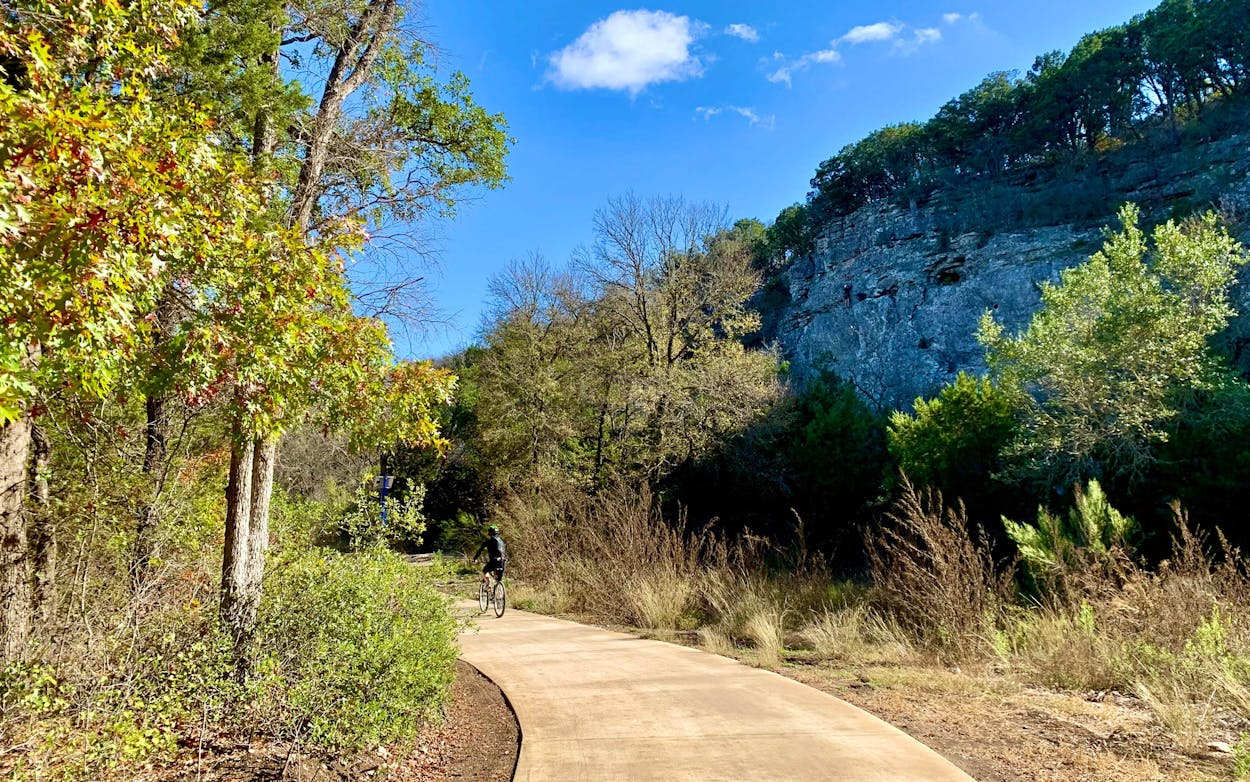Hiking 100 miles typically takes 5-10 days, depending on individual pace and hiking conditions. When planning a 100-mile hike, consider factors like terrain, elevation, and personal fitness level for an accurate timeframe.
Training beforehand and proper gear are crucial for a successful long-distance hike. Setting a comfortable daily mileage goal can help pace the journey and prevent exhaustion. Make sure to factor in rest stops and potential obstacles along the trail to ensure a safe and enjoyable hiking experience.
Proper preparation and a positive mindset are key to conquering a 100-mile hike successfully. So, lace up your hiking shoes and hit the trail for an unforgettable adventure!


Credit: www.texasmonthly.com
Choosing The Right Trail
Researching Trail Options
Before starting a 100-mile hike, thoroughly research the available trail options.
Considering Difficulty And Terrain
Assess the difficulty and terrain types to ensure suitability for your hiking abilities.
Key Factors to Consider: – Distance of the trail – Elevation gain – Trail conditions – Climate and weather – Available water sources Trail Difficulty Levels: 1. Easy 2. Moderate 3. Difficult 4. Very Difficult Terrain Types: – Flat and even – Rolling hills – Steep inclines and declines – Rocky or slippery surfaces – Vegetation density Trail Research Tips: 1. Review trail guides and maps. 2. Seek recommendations from experienced hikers. 3. Check recent trail reviews and updates. 4. Consider your fitness level and experience. By carefully selecting the right trail, you can ensure a successful 100-mile hiking experience that is both challenging and rewarding.Physical Preparation
Planning to hike 100 miles? Physical preparation is crucial. The time needed depends on individual fitness level, but generally takes 7-14 days of consistent hiking. Gradual training and conditioning are key to preventing injury and ensuring a successful trek.
Building Endurance And Strength
In preparation for a 100-mile hike, focus on Building Endurance and Strength through consistent training. Start Building Endurance by incorporating regular long-distance hikes into your routine. Increase your Strength with a mix of cardio and strength training exercises like squats and lunges.Training With A Loaded Pack
When Training with a Loaded Pack, gradually increase the weight to mimic the conditions of your hike. Go on practice hikes with your loaded pack to get accustomed to the added weight. Include uphill and downhill sections to simulate the terrain you’ll encounter during the 100-mile hike.Logistical Planning
When preparing to hike 100 miles, logistical planning is essential for a safe and enjoyable journey. From designing a detailed itinerary to arranging transportation and accommodation, meticulous planning ensures a smooth and successful hike.
Creating A Detailed Itinerary
A detailed itinerary is imperative for a 100-mile hike, outlining the daily distances, break times, and potential campgrounds. Including key landmarks, water sources, and emergency exit points will keep hikers informed and prepared. Additionally, considering the projected pace and varying terrain will aid in realistic planning and time management.
Arranging Transport And Accommodation
Securing transport to the starting point and from the endpoint of the 100-mile trail is vital. This may involve researching local transportation services, shuttle options, or car rentals. Additionally, booking accommodation at the conclusion of the hike, whether it is a hotel, campsite, or other lodging, ensures a relaxing conclusion to the adventure.

Credit: www.facebook.com
Nutrition And Hydration
Proper nutrition and hydration are essential factors to consider when preparing for a challenging hike, such as covering a distance of 100 miles. It is crucial to calculate your caloric needs and adopt effective hydration strategies to ensure you have enough energy and stay hydrated throughout the hike.
Calculating Caloric Needs
Knowing your caloric needs is essential to maintain energy levels during a long-distance hike. Generally, hikers require a higher caloric intake than sedentary individuals due to the increased physical activity and prolonged exertion. To calculate your caloric needs, you can use the following equation:
Caloric Needs (per day) = Basal Metabolic Rate (BMR) + Physical Activity Level (PAL) + Extra Calories
BMR represents the number of calories your body requires at rest. PAL takes into account your level of physical activity. Finally, you need to consider additional calories to account for the extra energy expended during the hike. It’s crucial to choose nutrient-dense foods that provide a good balance of carbohydrates, proteins, and fats to sustain your energy levels.
Hydration Strategies
Maintaining proper hydration is vital to preventing dehydration and ensuring optimal performance during a challenging hike. It is recommended to consume water frequently and consistently throughout the hike. Here are some hydration strategies to consider:
- Start the hike well-hydrated to prevent dehydration from the beginning.
- Carry a sufficient amount of water with you and have a plan for refilling along the way.
- Utilize a hydration pack or water bottles that are easily accessible and convenient to use.
- Drink water at regular intervals, approximately every 15-20 minutes, even if you do not feel thirsty.
- Consider electrolyte replacement through sports drinks or electrolyte tablets to maintain electrolyte balance.
- Monitor urine color for hydration status. Clear or pale yellow urine indicates proper hydration, while dark yellow urine signals dehydration.
- Avoid excessive intake of caffeinated or alcoholic beverages, as they can increase the risk of dehydration.
By following these hydration strategies, you will help ensure that your body remains hydrated and capable of handling the physical demands of hiking 100 miles.
Mental Preparedness
Mental preparedness plays a crucial role when it comes to tackling the challenge of hiking 100 miles. Your mind can be your biggest ally or your worst enemy on the trail. Developing a positive mindset, managing stress, and overcoming fatigue are all key components of mental preparedness. By focusing on these aspects, you can conquer the distance and make your hike a rewarding and memorable experience.
Developing A Positive Mindset
A positive mindset is essential for successfully completing a 100-mile hike. It helps you stay motivated, overcome obstacles, and push through difficult times. To develop a positive mindset:
- Set realistic expectations and goals for yourself. Breaking down the distance into smaller, achievable milestones can boost your confidence.
- Visualize your success. Imagine yourself crossing the finish line, enjoying the beautiful scenery, and feeling a sense of accomplishment.
- Remain optimistic and focus on the present moment. Embrace challenges as opportunities for growth and stay positive in the face of adversity.
- Surround yourself with supportive and like-minded individuals who share your passion for hiking. Their encouragement and enthusiasm can uplift your spirits and keep you motivated.
Managing Stress And Fatigue
Stress and fatigue are common companions on long-distance hikes, but with the right strategies, you can manage them effectively:
- Take regular breaks to rest and rejuvenate. Use this time to stretch your muscles, hydrate, and replenish your energy levels.
- Practice deep breathing exercises or meditation to reduce stress and stay calm. Focus on your breath and let go of any negative thoughts or worries.
- Listen to your body and recognize its limits. Pushing yourself too hard can lead to burnout or injuries. Take it slow and adjust your pace accordingly.
- Stay properly fueled and hydrated. Consume nutritious snacks and plenty of water to keep your energy levels up and prevent fatigue.
Mental preparedness is just as important as physical training when it comes to hiking 100 miles. By cultivating a positive mindset, managing stress, and addressing fatigue, you can conquer the psychological challenges of the journey and make the most of this incredible experience.

Credit: www.facebook.com
Frequently Asked Questions For How Long Does It Take To Hike 100 Miles
How Long Does It Typically Take To Hike 100 Miles?
On average, it takes about 5 to 7 days to hike 100 miles, depending on factors such as terrain, weather, and hiker’s fitness level. This estimation allows for a comfortable pace and time to enjoy the scenery along the way.
What Is The Fastest Time Someone Has Hiked 100 Miles?
The fastest known time for hiking 100 miles is an astonishing 13 hours and 48 minutes. This record was set by Joe McConaughy in 2017. It’s important to note that this achievement requires exceptional physical endurance, training, and a specific strategy.
How Can I Prepare For A 100-mile Hike?
Preparing for a 100-mile hike involves physical conditioning and planning. Start by gradually increasing your mileage while wearing a weighted backpack. Strengthen your muscles through regular exercise and focus on endurance training. Additionally, research and plan your route, pack essential gear, and practice hiking with a loaded backpack for a realistic experience.
Conclusion
The time it takes to hike 100 miles varies depending on factors like fitness level, terrain, and pace. It can take anywhere from 4-7 days for experienced hikers, and up to 2 weeks for beginners. Proper planning and preparation are crucial for a successful 100-mile hike.
Happy trails!